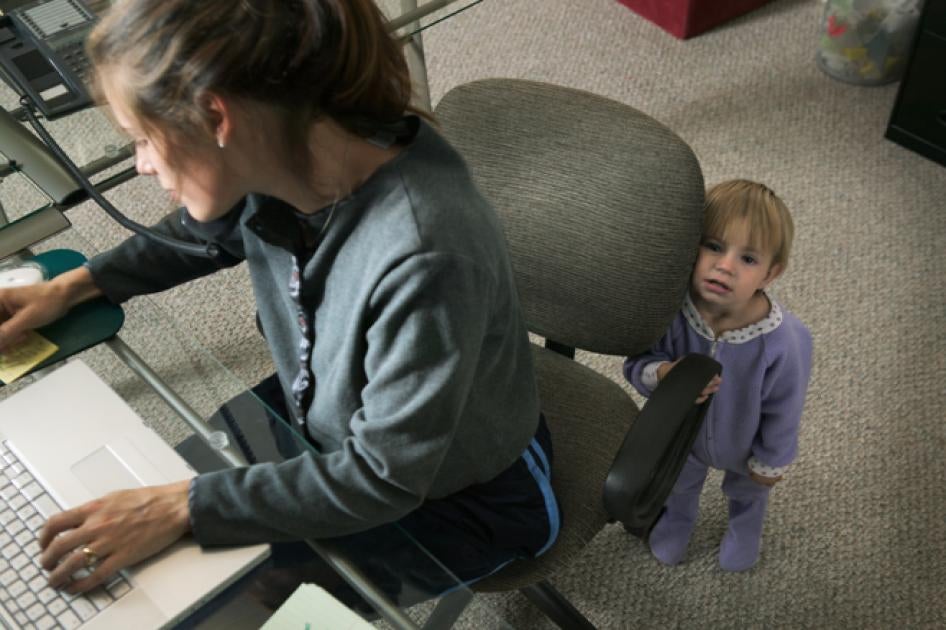“The baby needed so much, and I couldn’t take a break. I got postpartum depression,” Maria J. told me. Maria gave birth to a baby boy after a traumatic three-day labor and emergency Cesarean section.
While Maria and the baby were hospitalized, her husband, William, managed to take a couple of days off from his carpentry job. With a huge hospital bill and no paid family leave benefits, he couldn’t afford more unpaid time off when Maria and the baby went home. Maria was in pain, exhausted, and alone. “Even having my husband home for just like a week would have made everything better,” she said. William added, “I had to have money coming in…. I felt helpless.”
I interviewed Maria and William for a 2011 Human Rights Watch report (updated in 2015) on the lack of national paid family leave under law in the US. In dozens of interviews, parents across the country said that a lack of paid leave after childbirth or adoption contributed to delaying immunizations and health visits for babies, postpartum depression, and other health problems. Many who had no choice but to take unpaid leave went into debt, and some had to resort to welfare or bankruptcy.
The 1993 Family and Medical Leave Act (FMLA) offers only unpaid leave, and doesn’t cover all workers. Just four US states have paid family leave programs under law — California, New Jersey, Rhode Island, and New York. Lawmakers in other states are considering paid leave bills.
According to the US Bureau of Labor Statistics, only 13 percent of US private industry workers have paid family leave benefits through their employers. A national paid leave program is needed.
A federal bill — the FAMILY Act — that would go a long way toward fixing this problem was introduced in Congress on February 7. It would enable workers to take leave to care for new children or seriously ill family members, or to deal with their own serious health conditions, for up to 12 weeks while receiving partial pay. Coming 24 years after the FMLA, it would take the crucial next step of establishing paid family leave.
On the campaign trail, President Donald Trump acknowledged, to some degree, that the lack of paid family leave is a problem. He proposed six weeks of paid maternity leave for birth mothers, funded through unemployment insurance. This falls short of modern workforce needs by excluding fathers like William, adoptive mothers, and workers who need time off to care for other family members, like older parents or loved ones with serious health issues — a need that will only continue to grow with the aging US population. President Trump should join a large coalition of lawmakers, advocates, and business leaders in supporting a more inclusive plan.
In a November 2016 survey, 78 percent of voters polled said they would favor a national law to create a fund that offers all workers 12 weeks of family and medical leave with some pay when they need to care for a new baby or adopted child, have a serious illness, or need to care for a seriously ill family member. Democrats, Republicans and Independents surveyed all voiced strong support for a paid leave policy.
The US is alone among developed countries in failing to guarantee any paid family leave. Out of 185 countries covered in a 2014 International Labour Organization report, only two lacked paid maternity leave under law: the United States and Papua New Guinea. At least 70 countries guarantee paid paternity leave. Many countries have other forms of paid family leave and self-care leave.
Maria and William said they look back at their baby’s birth as a time of trauma, financial devastation, and isolation. It shouldn’t be that way.
Members of Congress should pay attention to what voters want and what workers need. They should pass the FAMILY Act.









